Life is honored by hearing those who immolate themselves, for no one knows what might rise from their ashes, says Sam Husseini.
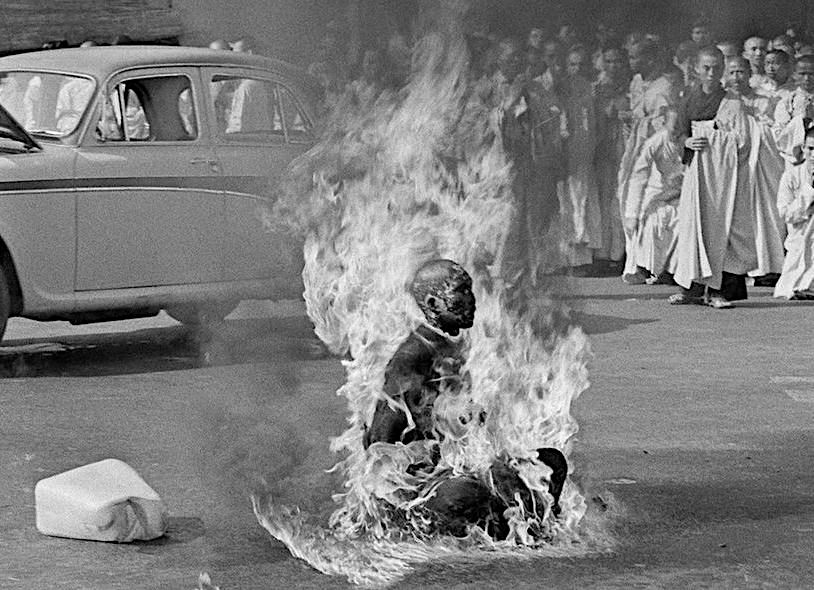
Buddhist monk Thich Quang Duc burning himself to death in Saigon in protest of persecution of Buddhists by the South Vietnam government. This photograph won the World Press Photo of the Year for 1963. John F. Kennedy said that “No news picture in history has generated so much emotion around the world as that one.” (Originally distributed by the Associated Press and published in numerous newspapers on June 11, 1963, now in Public domain/Wikimedia Commons)
By Sam Husseini
Substack
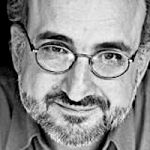
The “authorities” are not telling us the person’s name or anything about them, but someone immolated themselves with a Palestinian flag outside the Israeli consulate in Atlanta on Friday afternoon.
What we do know is that the Israeli government is finding new levels of deprivation daily. On this matter, they put out a statement: “It is tragic to see the hate and incitement toward Israel expressed in such a horrific way.” Brannon Ingram wrote: “How self-centered can you possibly be? Self immolation is never an act of ‘hate.’ It’s the opposite. It’s a desperate plea for humanity.”
A security guard was also burned.
The Twitter account of the government that is slaughtering thousands of Palestinian children, women, and men on a daily basis added: “The sanctity of life is our highest value.”
Meanwhile the Atlanta police chief said: “We believe this building remains safe, and we do not see any threat here.” Thank goodness the building is safe, unlike every building in Gaza. Maggi Carter wrote: “never mind the desperation of a situation inspiring self-immolation.”
The piece below was originally published on February 18, 2011, shortly after the Arab uprisings began, sparked by Mohamed Bouaziz, a Tunisian fruit vendor, immolating himself.
Twenty Years Ago Today — Immolation Revolutions Now; and the Ones to Come
Let a man in a garret but burn with enough intensity and he will set fire to the world. —Antoine de Saint Exupéry (best known as the author of The Little Prince)
Perhaps it was just a coincidence that he used newspapers to do it.
But I don’t think so.
From what I know of Greg, he had a sense of symbolism. I don’t know a thing about the other two Americans from that year.
I do know some about Mohamed. Much of the world does. That’s because when he set himself ablaze, his town, nation and people followed.
But Greg was not so lucky.
Twenty years ago today — as the U.S. bombing of Iraq in the Gulf War entered its fifth week — a few minutes before 2, Gregory Levey walked to the Amherst, Massachusetts, town common with newspapers stuffed under his clothing. He doused himself with paint thinner. The first match went out. With the second, he lit himself afire.
You probably haven’t heard of him; he doesn’t even have a Wikipedia entry. In all the stories last month about self-immolations, none I could find mentioned him. Instead they all focused on self-immolation cases from the Vietnam War.
Please DONATE to CN’S Winter Fund Drive
This was partly because the sociologist many turned to, Michael Biggs at Oxford, who wrote the paper “Dying Without Killing: Self-Immolations, 1963-2002,” emailed me that he didn’t know about Levey. A New York Times article shortly after Levey’s death refers to two others who killed themselves protesting the Gulf War 20 years ago — I’ve as yet been unable to find anything about them, not even their names.
Levey had a placard with the word “PEACE” written on it and his drivers licence attached.
Jennifer Cannon recently wrote me:
“I was one of the first people on the Amherst Common after Greg’s self-immolation. I was a UMass undergraduate student at the time. A group of us formed — anti-war students, local community members, Buddhist monks from the Leverett Peace Pagoda — and we held vigil 24 hours a day until the town forced us to leave about two weeks later.
It was a profound and deeply moving experience. Everyone involved with the vigil knew that Greg chose to end his life in order to make a statement about how wrong the war was. … Maintaining the vigil in ‘liberal’ Amherst was not easy. We were harassed every day and night — often with trucks driving by with the American flag, honking their horns and people yelling and swearing at us. We were seen as anti-war and therefore as unpatriotic and not supporting the troops. … It is devastating that the war continues.”
It’s an interesting phrase by Jennifer. Few public conversations consider that fundamentally, it’s all been one long war since 1990 that has manifested itself in different ways. The 20th “anniversary” of the Gulf War has gone virtually unmentioned I think in large part because, to acknowledge it in a meaningful way, the U.S. would have to stop pretending that it was just minding its own business when the 9/11 attacks happened.
[Related: JOHN KIRIAKOU: A Victimizers’ Memorial]
Two memorial journals were filled during the vigil following Greg’s death. One page read:
“It’s raining now, the day after your courageous, determined, peace-filled death. It snowed last night and now there’s a circle of stars surrounding snow flows of every color … It’s beautiful. We continue to live in hope that your action and our actions will stop this war, this madness, the killings and that as we approach the 3rd millennium, we will truly live in peace. Wherever you are, you will be in my heart forever. Peace and love to you.”
Whoever wrote that was trying to give Levey’s being life.
The White House Lie About Mohamed Bouaziz
In contrast: On Feb. 4, White House spokesperson Robert Gibbs said: “And as we recall, a fruit vendor in Tunisia had his fruit stolen and lit himself on fire.” Gibbs kills. He kills because he tries to deceive about death, about someone’s sacrifice for others. Gibbs doesn’t want people to know that Mohamed Bouaziz, whose self-immolation sparked the uprising in Tunisia, was slapped around not by robbers, but by Tunisian government forces.
He doesn’t want people to know that Bouaziz set himself on fire in front of the municipal building in his town of Sidibouzid, literally taking his grievance to the government’s doorstep.
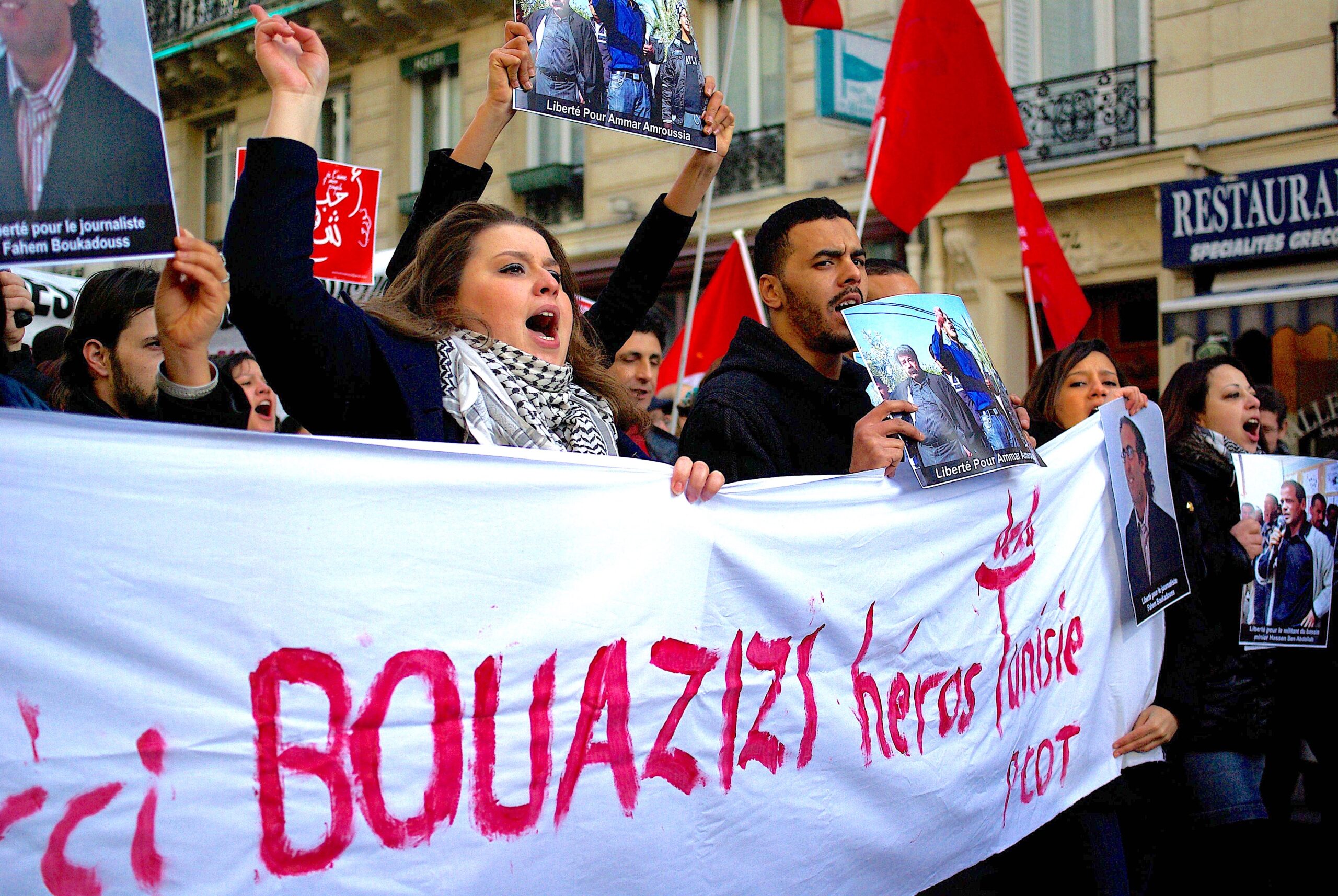
French protest in support of Bouazizi, “the Hero of Tunisia,” Jan. 15, 2011. (Antoine Walter, CC BY-SA 2.0, Flickr & Wikimedia Commons)
The columnist James Carroll recently wrote:
“But, for all the desperation that might motivate self-immolation — born perhaps of nobility, but also perhaps of crushing mental illness — it is urgently important to decry such violence. That it is inflicted against the self makes it different from assault against others, but it is still violence. All cults of martyrdom are inhumane — including self-martyrdom. … In the face of death in all its forms, choose life.”
This is directly contradictory to the view of the Jesuit priest Daniel Berrigan:
“I think in Christianity that something very great has been lost. Jesus’ death, I think, in a very deep sense can be called a self-immolation. I mean that He went consciously to death, choosing that death for the sake of others, reasonably and thoughtfully.”
Berrigan argues that people who burned themselves protesting the Vietnam War should not be said to have committed “suicide” since “suicide proceeds from despair and from the loss of hope and I felt that [Roger Laporte, a Catholic Worker self-immolator] did not die in that spirit.”
‘To Wake Us Up’
Thich Nhat Hant, a Buddhist monk says of self-immolation:
“I think we must try to understand those who have sacrificed themselves. We do not intent to say that self-immolation is good, or that it is bad. … When you say something is good, you say that you should do that. But nobody can urge another to do such a thing. … It is done to wake us up.”
He relates the story of a young Vietnamese woman, Nhat Chi Mai, who immolated herself — and was so joyous the month before that people thought she was planning on getting married. He also argues that others are burning themselves but [quoting another monk] “in a slower way. I am burning myself with austerity, with active resistance against the war.”
(See chapter on self-immolation in The Raft is not the Shore — conversations between Berrigan and Nhat Hanh). In some ways, self immolation is an attempt at a life of service all at once. We are all oxidizing slowly, they chose it all at once.
Kathy Change
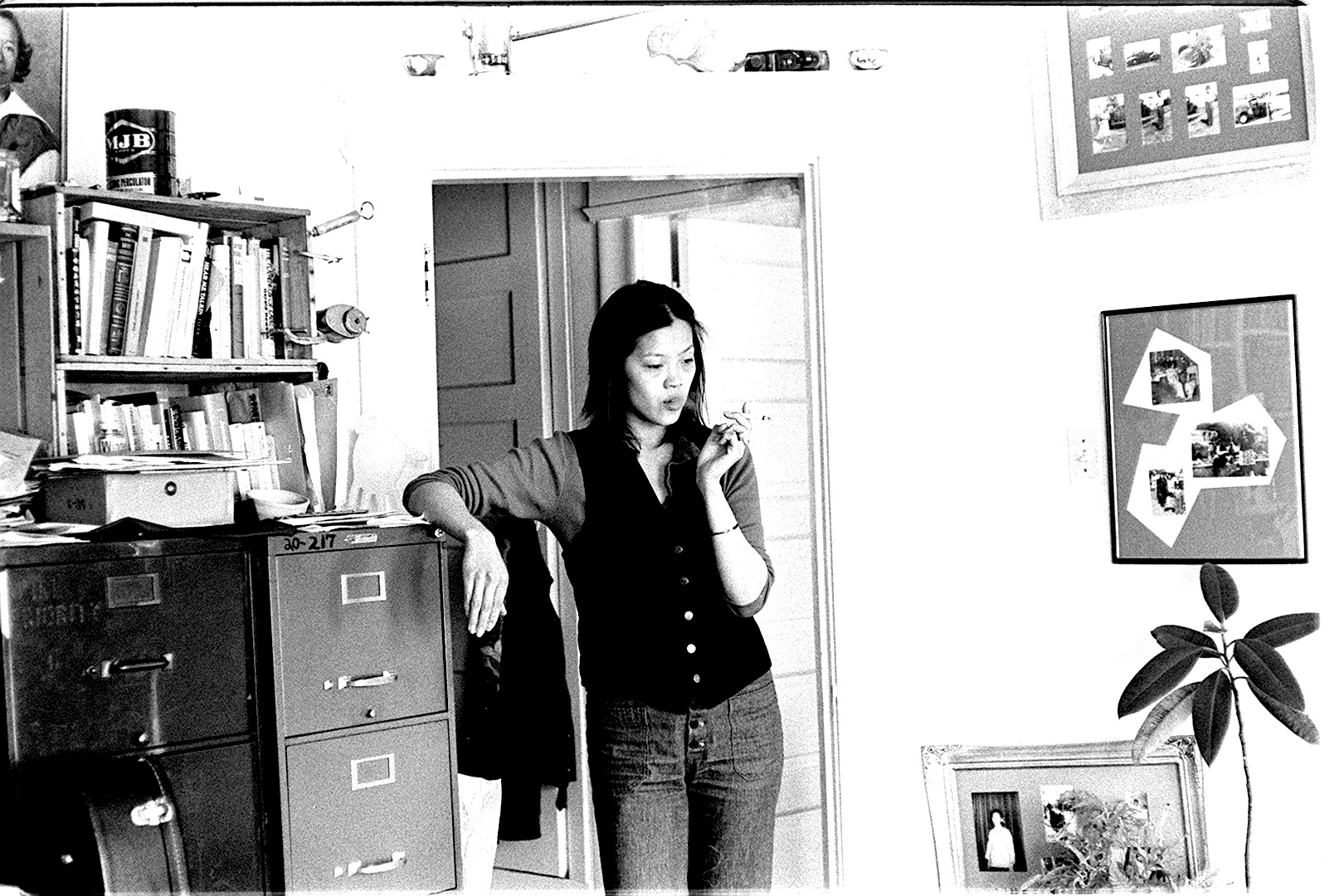
Kathleen Chang (or Kathy Change her performance name) in her San Francisco apartment in 1975. (Nancy Wong, Wikimedia Commons, CC BY-SA 4.0)
At least two other people in the U.S. have immolated themselves since the Gulf War (see list of political self-immolations). In 1996, Kathy Change immolated herself in Philadelphia, craving some attention for her desire to remake society.
She wrote:
“I want to protest the present government and economic system and the cynicism and passivity of the people … as emphatically as I can. But primarily, I want to get publicity in order to draw attention to my proposal for immediate social transformation. To do this I plan to end my own life. The attention of the media is only caught by acts of violence. My moral principles prevent me from doing harm to anyone else or their property, so I must perform this act of violence against myself.”
Malachi Ritscher
In November 2006 Malachi Ritscher immolated himself in Chicago. “Maybe some will be scared enough to wake from their walking dream state” he wrote.
“When I hear about our young men and women who are sent off to war in the name of God and Country, and who give up their lives for no rational cause at all, my heart is crushed. … Half the population is taking medication because they cannot face the daily stress of living in the richest nation in the world….
The violent turmoil initiated by the United States military invasion of Iraq will beget future centuries of slaughter, if the human race lasts that long. … Wouldn’t it be better to stand for something or make a statement, rather than a fiery collision with some drunk driver? Are not smokers choosing death by lung cancer? Where is the dignity there?”
I recall being appalled by the lack of media coverage of Ritscher’s death. Even programs like Democracy Now! wouldn’t mention it.
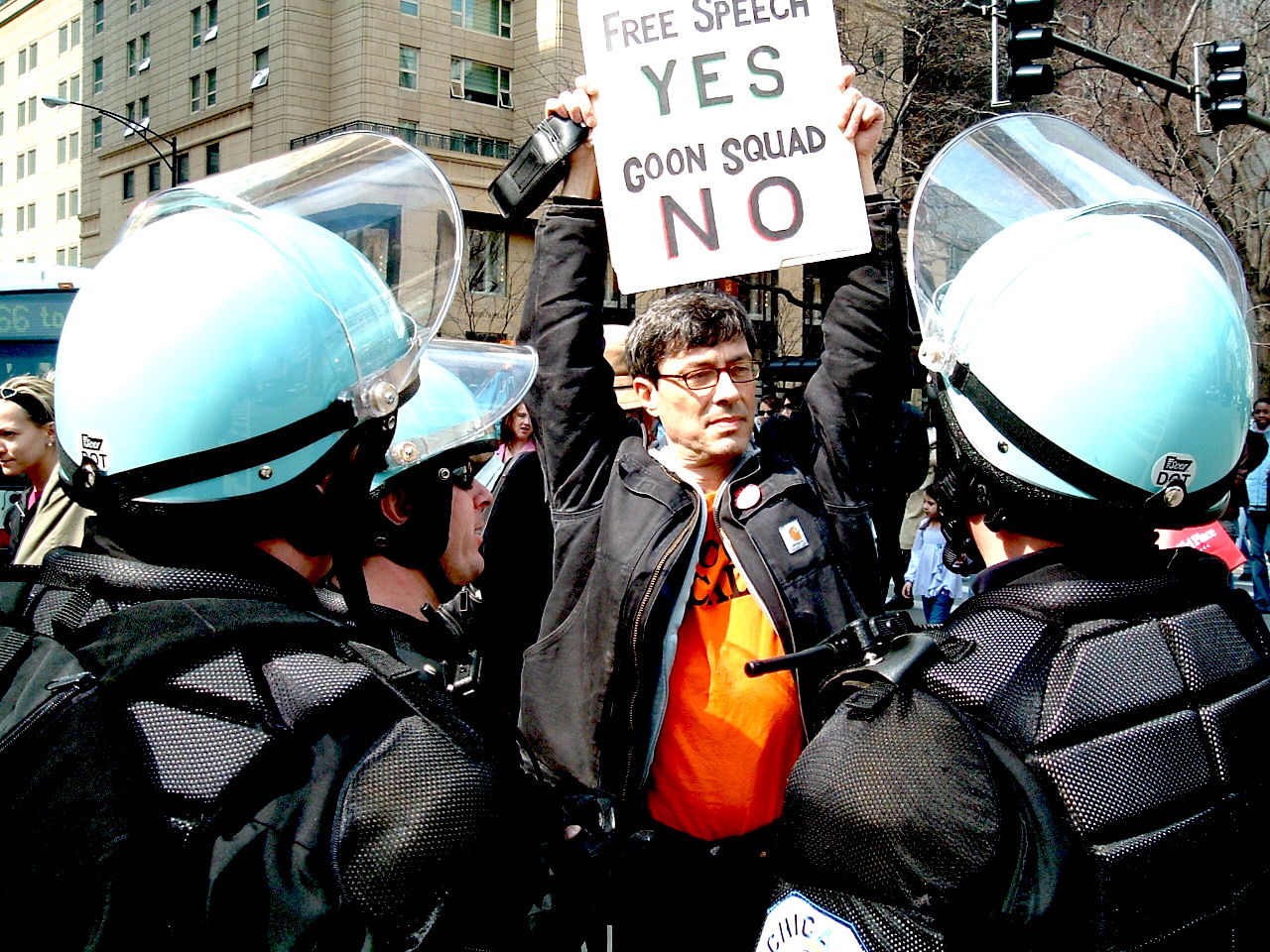
Ritscher, who later self-immolated, getting arrested in Chicago for standing on the corner and holding his sign, Jan. 12, 2006. (Dan Sloan, Flickr, CC BY-NC 2.0)
Aaron Glantz reported late last year:
“In the six years after Reuben Paul Santos returned to Daly City from a combat tour in Iraq, he battled depression with poetry, violent video games and, finally, psychiatric treatment. His struggle ended last October, when he hung himself from a stairwell. He was 27. … An analysis of official death certificates on file at the State Department of Public Health reveals that more than 1,000 California veterans under 35 died between 2005 and 2008. That figure is three times higher than the number of California service members who were killed in the Iraq and Afghanistan conflicts over the same period.”
This didn’t count the reckless deaths. Glantz found 10-times as many motorcycle deaths by veterans over non-veterans.
Bouazizi wrote on his Facebook page before immolating himself:
“Traveling, o Mom. Forgive me. No blame is beneficial. Lost in a path that is out of your hands. Forgive me, if I disobeyed the word of my mother. Blame the time and not me. Leaving but not returning. For much I cried and tears streamed from my eyes. No blame can benefit in a time that is treacherous in the land of people. I am tired and all that passed left my mind. Traveling and asking what can make you forget.”
Mohamed Bouaziz, Greg Levey and the others who immolated themselves recently in Egypt, Algeria, Saudi Arabia, Morocco and Mauritania — whom we know little about so far — seem to represent neither the lonely despair of veteran suicide, nor the near joyous embrace of the Vietnamese woman Mai.
They represent a desire to leave an oppressive life, but to leave it in such a way that might benefit others. A refusal to live in permanent subjugation — a liberty though death — and a hope that by exiting that subjugation though death, a dignified life might be achieved for others who one loves.
Shortly after Bouazizi’s death (he lived for several weeks after his Dec. 17 immolation) the Tunisian activist Fares Mabrouk said to Democracy Now: “The lesson from the Tunisian people is a lesson of dignity. I have a video of two days ago. Two days ago, from the balcony of downtown Tunisia, people were shooting from the window, ‘Dignity! Dignity!’ at 2 in the morning.”
A short time later Egyptian activist Asmaa Mahfouz recorded a YouTube video calling for protests on Jan. 25. It began:
“Four Egyptians have set themselves on fire, thinking maybe we can have a revolution like Tunisia … maybe we can have freedom, justice, honour and human dignity. Today, one of these four has died, and I saw people commenting and saying: ‘May God forgive him, he committed a sin, and killed himself for nothing.’ People, have some shame. …”
A lengthy piece about Levey by Pippin Ross in Boston magazine [June 1991] tells us:
“[Robert] Levey says that his son was both outraged and amused by how the established press does little more than swallow the government line. ‘I think American foreign policy is central to why he is dead,’ says Robert Levey.” Both Greg’s father, Robert, and his step mother, the columnist Ellen Goodman, were in the newspaper business.
The Boston magazine piece gives a chronology of Levey’s last days. It doesn’t state it, but from the chronology, one can extrapolate that Levey seems to have been stunned by the Feb. 13 bombing of the Amariyah Shelter, which killed hundreds of Iraqi civilians. I recall being devastated by it — and by the incredibly callous media coverage of it. So of course, Levey and the others were victims of media in death as well as in life.
Life is burned and demeaned by ignoring what sacrifice someone has made, and why. And life is honored by hearing those who immolate themselves, for no one knows what might rise from their ashes.
Thanks to the activist community of Amherst and the staff at the Jones Library for material on Greg Levey’s life.
Sam Husseini is an independent journalist based near D.C. He is on Twitter: @samhusseini.
The views expressed are solely those of the author and may or may not reflect those of Consortium News.
Please DONATE to CN’S Winter Fund Drive



I would like to call attention to another person who has been forgotten, Dr. Rafil Dhafir.
During the 1990’s some Americans publicly challenged the sanctions against Iraq by violating them. One of them was Dr. Dhafir, who set up an organization to send assistance to Iraqis. At the time, the U.S. government did not prosecute such people, probably because they wanted to keep the carnage caused by the sanctions out of view of the American public and they did not want to appear pro-famine.
After the invasion of Iraq, however, the sanctions were no longer needed, and it was safe to prosecute such people. The government decided to prosecute Dr. Dhafir, which they did successfully:
hxxps://en.wikipedia.org/wiki/Rafil_A._Dhafir
This article is both chilling and moving. I can particularly identify with Gregory Levey, an individual who most “probably haven’t heard of”. Yet he was a person who obviously believed he had an important message – in the symbolism of action – for a world largely blind and deaf to his cries. In despair there can be hope. The greatest cause of despair, and I know I can’t attribute words to Mr Levey, must be the feeling of powerlessness, that you see a direction of events that those leading humanity towards are oblivious to. That, I do understand, for sometimes the unknown can have the prescience to know. Always a frustrating feeling – but I keep writing – and always honouring those with bravery to take action.
In remembrance of Jan Palach Czech student of history and political economics at Charles University in Prague. His self-immolation was a political protest against the end of the Prague Spring resulting from the 1968 invasion of Czechoslovakia by the Warsaw Pact armies:
hxxps://en.wikipedia.org/wiki/Jan_Palach
“It is tragic to see the hate and incitement toward Israel expressed in such a horrific way.”
This bald expression and exposure of who the Zionists actually are in all of their ‘glorious’ conceit and obtuseness can only be summed up as their own adding fuel to the fire they themselves have set against others.
People of Israel, you dual-citizens too, should remember, you should already know: “Fire Burns.” Everyone.
Thank you for this very thought-provoking piece. We are truly in desparate times and so many don’t realize that!
That is the frustrating part Sharon. And i often wonder if it’s true or willfull ignorance.
I think a lot of it is willful ignorance. Many people outside the activist community in my family and friends circle forcefully resist any suggestion of information that doesn’t come from official sources. They appear deathly afraid of being associated with anything that could be construed as too radical or outside the mainstream. They are conformist to the point of fearing the thought process itself. It feels like the real zombie apocalypse.
It has been concertedly and purposefully pursued for just that end, Lois. Those who would and do rule over us have us en masse inside psychological boxes they have meticulously constructed, playing on our base fears primarily in particular.
We who by conscience are compelled to relentlessly pursue truth and some modicum of justice—if judging by human history—will always occupy this kind of lonely space “outside the box” and the profound odds against us precisely because of the base fear-driven nature of our bio-psychological construction.
Courage, lass, courage and fortitude be yours. To thine own self be true. You are not alone.
How right you and Lois are. Especially your mention of fear, David. They prey on that primal emotion in order to control us. It is lonely “outside the box”. But i believe it’s preferable to living in fear.
Definitely willful ignorance. We are all ignorant, but most people are willfully so. But when you are taught to lie from the day you were born (if not while in the womb!), truth seems frightening and foreign. It is so much easier to swoon and wallow in bewilderment than it is to open your ossified brain, let in fresh air and information, and begin to grow up. Because in order to deal with reality, you must mature emotionally and psychologically, and that is a great deal of work.